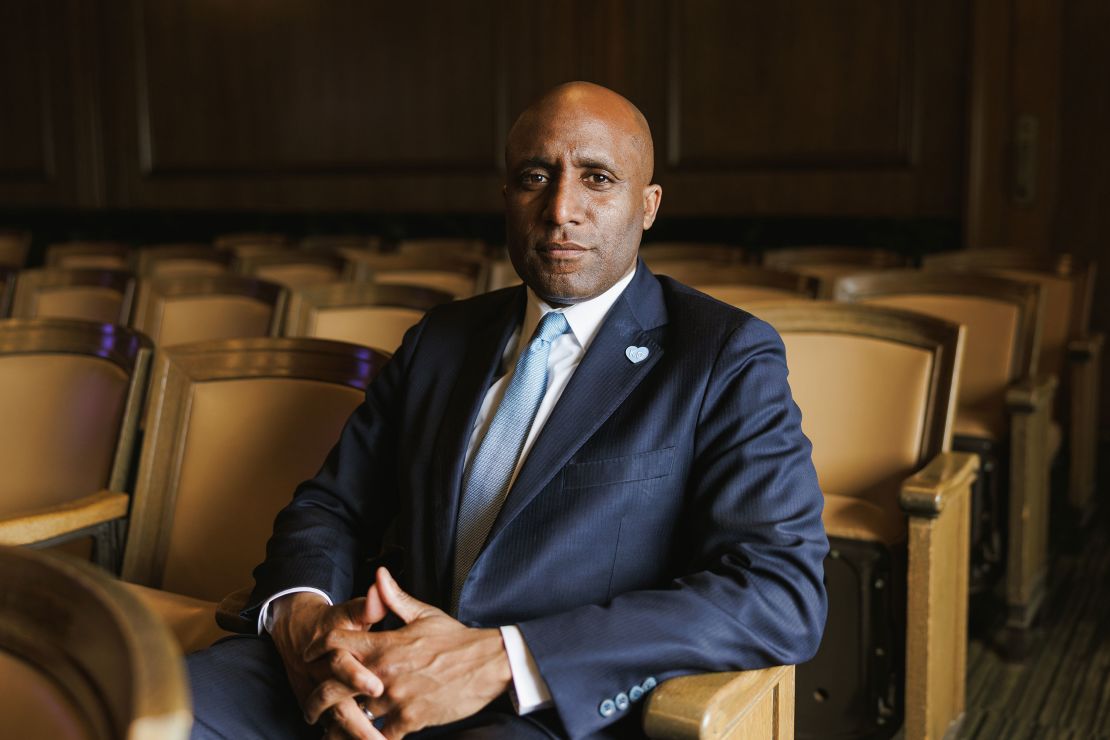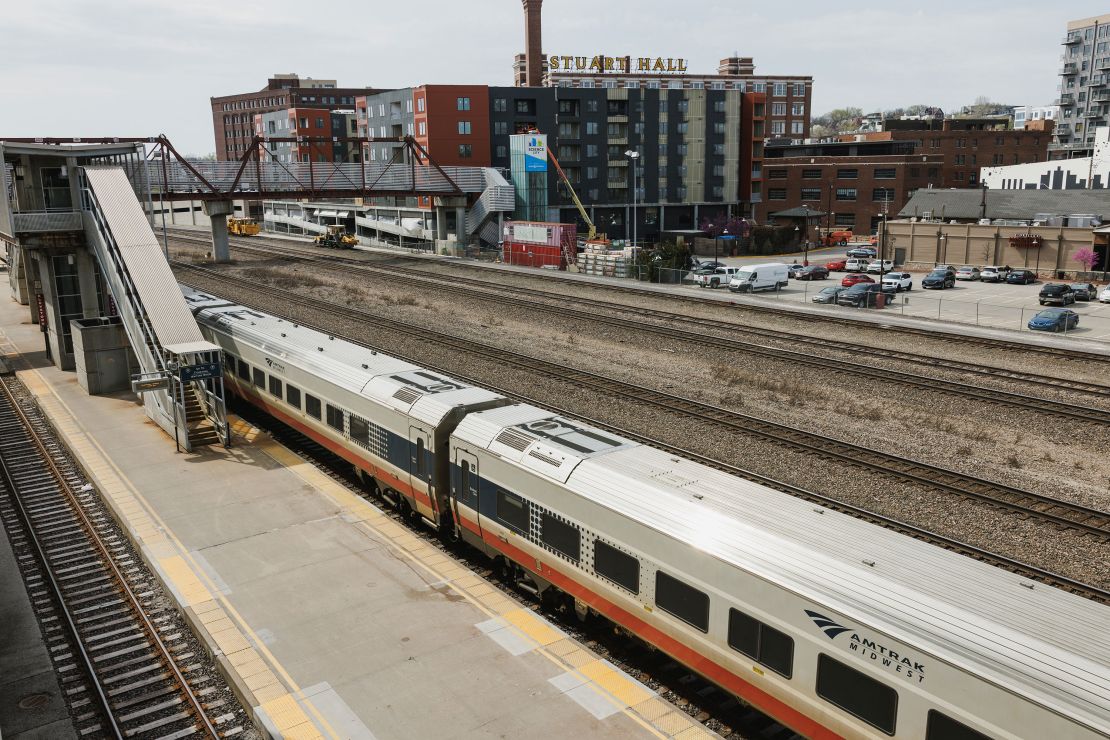Kansas City, Missouri
CNN
—
Baseball’s opening day is usually one of jubilation for Kansas City, whose Royals are two-time World Series champions. But for Jason Buck, this year’s home opener against the Cleveland Guardians served as a reminder of the uncertainty he faces.
Buck took on a part-time job bartending at the team’s Kauffman Stadium after being terminated – and then placed on administrative leave after the position was restored – from the General Services Administration. He took a pay cut from a prior job to join the federal government a year ago, managing fleets of government vehicles for the Pentagon, Veterans Affairs department and the Secret Service, hoping it meant longer-term job security.
“It was a risk worth taking for me,” Buck told CNN. “I knew the value of working for the government.”
Steep federal layoffs driven by the Department of Government Efficiency have caused shockwaves in the nation’s capital, but the ripple effects extend far beyond Washington.
In the Kansas City region, where the federal government is the largest employer, big regional hubs for federal agencies are bracing for new waves of cuts in the coming weeks. Employees across a variety of agencies including the Internal Revenue Service and the Social Security Administration say they expect to know their fate in mid-April.
Under plans proposed by the Trump administration, some government agencies could shrink by up to half; the moves are expected to leave thousands of Kansas City’s 30,000 federal workers looking for a new job.
“I’ll be honest, it’s going to hurt the city. It’s going to hurt the people a lot,” Mayor Quinton Lucas told CNN. “It’s going to hurt their families, and it’s going to hurt a lot of secondary businesses in places like Kansas City.”

For each federal worker who loses a job and pulls back his or her spending, business activity in other industries would start to slow, according to the Mid-America Research Council, which estimates job losses in those industries could outpace the government.
A draft analysis conducted by MARC economist Frank Lenk estimated that, if the federal government reduces its workforce by 20%, Kansas City could lose a total of 14,600 workers. The losses would be felt most in construction, retail, health care, professional services, and the hospitality industry, Lenk says.
“There’s a multiplier effect,” Lenk tells CNN.
That uncertainty is already beginning to spill over into the city’s otherwise-strong spring real estate market. Several federal workers told CNN they worry they’ll have to sell their home if they can’t afford their mortgage. One employee has timed the purchase of a new house to close before a reduction in force would take place.
Michael Pierce, whose Seek Realty represents buyers and sellers in Kansas City, says laid-off workers are trying for now to find ways to stay put because alternative options are even more expensive, due to high prices and interest rates and few homes available on the market.
But those statistics, he says, are likely a lagging indicator of fear across the city.
“By the time the statistics reflect what we’re up against… it’s going to be too late,” Pierce said while driving around some fed-heavy neighborhoods in the area. “We need to look at the emotional toll this takes on the housing market and the economy in general.”
In the city’s downtown, questions persist over whether office buildings will be vacated, with the Trump administration floating the possibility last month of selling at least four government buildings in Kansas City. The General Services Administration had initially identified the Bolling building as one of those properties it planned to sell, though it later didn’t include the building on a list of properties for “accelerated disposal.”
On a recent weekday at sunrise, the building’s two parking lots were nearly full, with workers from the Social Security Administration and US Army Corps of Engineers having returned to the office. That increased traffic has benefited nearby Waterbird Coffee, but owner Brian Denham says layoffs could hurt business.
“We get a decent percentage of sales from that building,” Denman told CNN. Federal workers who visit the shop, he said “don’t know if they’re going to have a job within the next hour, the next week.”
Lucas says he’s trying to fast-track fired workers for jobs in his administration at City Hall – but acknowledges the region can’t absorb all the employees who will be out of work.
“We’re not building a new 4,000-person factory to replace 4,000 jobs with the IRS at the same time,” Lucas, a Democrat, tells CNN. “And frankly, these folks will have very different skills.”
Unemployment in the Kansas City area is relatively low, at 4.2%, and the region has thousands of job openings. But matching them to workers with relevant expertise could prove difficult. The area’s most well-known companies – like Hallmark greeting cards, Garmin technology and Oracle health care – aren’t hiring government workers in droves, Lucas says. And while tax preparation company H&R Block is based in the region, IRS employees are bound by a noncompete agreement that bars them from serving in tax-related roles for one year after departing, employees say.

Buck is just one of the employees who is grappling with a new reality. His employment was reinstated at GSA, and he returned to work on March 28.
But he plans to continue working part-time to save extra money – and to keep interviewing for new jobs as a precautionary measure.
“I don’t know if I’m going back just to be a part of a reduction in force at some point,” Buck says. “I have no idea what to expect.”
Daniel Scharpenburg joined the Internal Revenue Service 16 years ago, and he hoped his seniority would spare him the worst of the cuts. But Scharpenburg worries that the collections department where he works could see further cuts.
Worried about financial security for himself and his two teenaged kids – and the competition for jobs if he got laid off – Scharpenburg found a part-time job at a movie theater.
“I’m 45 years old. I’m too old to be working two jobs,” Scharpenburg told CNN. “Some days I get off work here and I go straight to the movie theater.”
Shannon Ellis is a 28-year veteran of the IRS and now also runs the local chapter of the National Treasury Employees Union. She’s asked her real estate agent what her home could fetch in a sale. She suggested she and her husband could buy a mobile home and relocate to a lakefront lot her daughter owns. Ellis’ biggest concern was paying for healthcare for herself and her husband, who both contend with medical issues.
“I would have to literally sell my home, pay off everything, and hope to get a job that at least would pay me more than minimum wage to survive,” Ellis says.
Treka Henry works as a senior program analyst at the Department of Housing and Urban Development. She’s expecting to lose her job as part of an ongoing reduction in force. Her family has cancelled a regular house cleaner and decided to forego a vacation this year.
“We can’t foresee our future,” Henry said, her eyes welling up with tears.
The counties calling Kansas City home on both sides of the state border are blue. But Trump won many of the suburban and exurban counties that ring the city. And voters have indicated they still support him.
During his first term, Trump’s Agriculture secretary Sonny Perdue relocated two USDA divisions to Kansas City, pledging $300 million in cost savings and better proximity to farmers. Now, USDA is among the agencies expected to shrink: GSA is proposing to sell one of the agency’s buildings near the state line.

Missouri GOP Sen. Josh Hawley had been a proponent of relocating agencies outside Washington, proposing a bill in October 2019 to move nearly all of USDA to his home state. Asked about the impact of recent DOGE moves on federal workers, Hawley told CNN he believes most people in his state are in favor.
“If you ask most Missourians, I think they’re going to say they would like to see a freeze on federal aid and they want to see Medicare, Social Security, Medicaid … benefits delivered on time,” Hawley told CNN, suggesting the cuts would make the agencies more efficient.
Others see the cuts hitting closer to home. Ellis says that some local Treasury employees who voted for Trump have expressed regrets.
“I’ve had people approach me in this building and state: ‘Look, if I knew that this was what was going to happen, that all these attacks on federal agencies, I would have voted a different way,’” Ellis told CNN.
In late February, Missouri Republican Rep. Mark Alford drew the ire of his suburban Kansas City constituents – some of whom had lost their jobs – when he suggested their positions were not meant to be a “lifetime appointment” and that “God has a plan and a purpose for your life.”
Lucas had a sharp response to Alford’s comments.
“I’m faithful too,” the mayor told CNN. “But these are folks who got to pay their bills tomorrow.”
CNN’s Aileen Graef and Morgan Rimmer contributed to this report.





